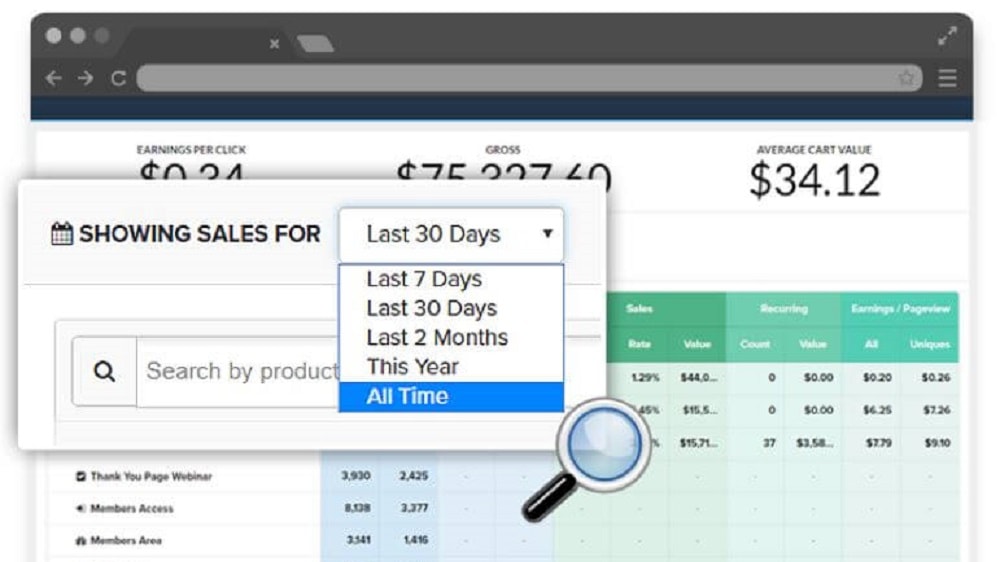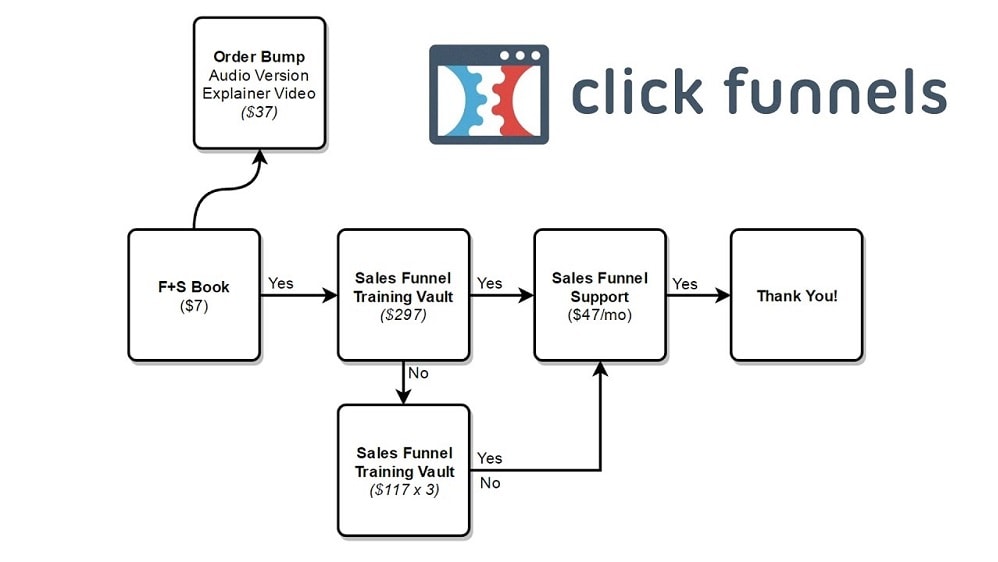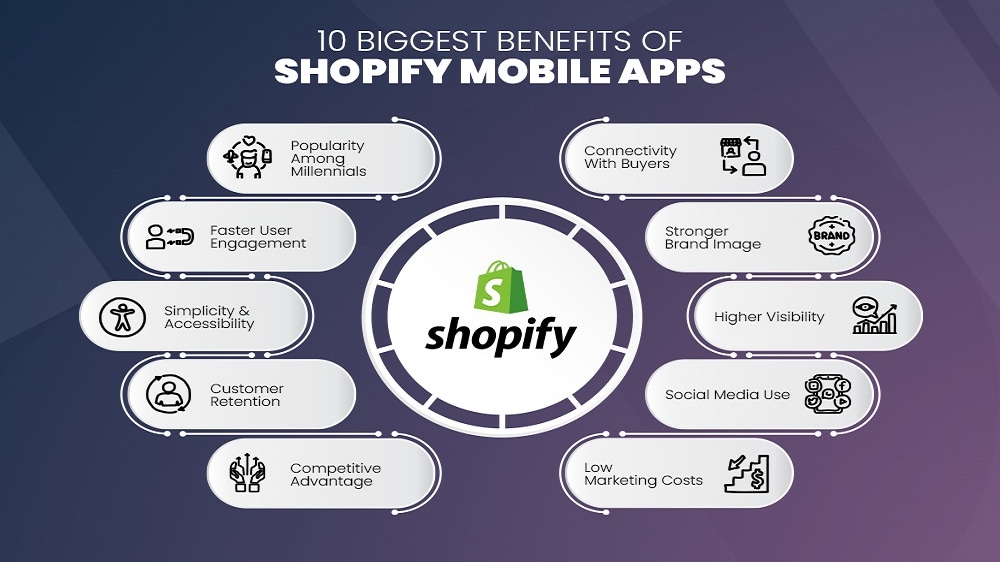ClickFunnels vs Shopify: How to choose the best tool for your business
- 01ClickFunnels vs Shopify: overview
- 02What's the difference between ClickFunnels and Shopify?
- 03ClickFunnels pros and cons
- 04Shopify pros and cons
- 05ClickFunnels compared to Shopify
- 06Shopify compared to ClickFunnels
- 07Features comparison
- 08ClickFunnels vs Shopify: Which is the best for your business?
- 09Promotions on Email Marketing software
- 10Alternatives to ClickFunnels & Shopify
Access up to $197 savings on ClickFunnels & $1,150 on Shopify
Access up to $197 savings on ClickFunnels & $1,150 on Shopify
When entering the world of e-commerce, choosing the right digital tool to support your business is crucial. Whether you’re looking to set up a robust online store or need help maximizing marketing and sales funnels to grow your digital business, the options are endless.
ClickFunnels and Shopify are popular solutions in this space, each specializing in distinct aspects of digital sales. While ClickFunnels is ideal for creating high-conversion sales funnels, Shopify is known for its comprehensive online store features. In this article, we look closely at the platforms’ core features, pros and cons, and key differences to help you decide on the best tool for your online business.
ClickFunnels vs Shopify: overview
ClickFunnels and Shopify are leading contenders in the realm of online sales and e-commerce platforms, each offering distinct features and advantages tailored to different user requirements.
ClickFunnels is recognized for its focus on funnel building and conversion optimization. It provides a streamlined platform for designing high-converting sales funnels, from landing pages to checkout processes, aiming to maximize lead capture and sales. On the other hand, Shopify is renowned for its comprehensive e-commerce capabilities. With a wide array of features, including inventory management, payment gateways, and a vast app ecosystem, it is built to cater to online merchants of all sizes, ensuring scalability as a store expands.
Now, let's explore the ClickFunnels vs. Shopify comparison to assist you in making an informed choice when it comes to selecting the right online sales platform for your specific needs.
What's the difference between ClickFunnels and Shopify?


You can use ClickFunnels or Shopify to sell physical and digital products, including setting up a dropshipping store. However, the two platforms have distinct primary focuses, which may guide your choice of the best solution for your business. ClickFunnels places a strong emphasis on marketing, with sales funnels as a core feature. Compared to ClickFunnels, Shopify is a comprehensive e-commerce platform designed for building online stores.
The different focuses of the platforms are reflected in their respective features. ClickFunnels’ e-commerce capabilities are less extensive than Shopify’s, while Shopify’s marketing features are somewhat limited. Shopify is a full e-commerce solution. It offers a built-in payment gateway, whereas ClickFunnels requires integration with a payment gateway app. Shopify also includes automatic sales tax calculations, themes to customize your shop, advanced inventory management, bulk upload product listings, and built-in shipping features through its partnerships with UPS, DHL, and USPS. Although Shopify offers some marketing features, such as Shopify Email, they tend to be more basic than ClickFunnels’ advanced marketing features.
While you can use ClickFunnels’ website builder to create a platform to sell products, its dedicated online store feature is still in development. Instead, ClickFunnels focuses on converting website visitors into customers by leveraging robust marketing features. Specifically, these are sales funnel and marketing automation features that support lead generation, upselling, and product launches. It includes an advanced email marketing tool equipped with A/B testing features and template funnels to help grow your business. There are two further differences to note. Firstly, Shopify has a full-featured app for Android and iPhone. ClickFunnels’ app only provides ClickFunnel statistics. Secondly, ClickFunnels includes features to build and sell online courses. While you can sell courses with Shopify, it doesn’t offer a course-building feature; instead, you need to rely on integrations.

1 month free on the Pro plan on ClickFunnels
Get 1 month free on the Pro plan on ClickFunnels and up to $197 savings with Secret.
ClickFunnels pros and cons
What are the advantages of ClickFunnels?
- Easy funnel building: ClickFunnels provides a user-friendly drag-and-drop editor that makes building sales funnels straightforward, even for those without technical expertise.
- All-in-one solution: Beyond just creating landing pages, ClickFunnels offers capabilities for email autoresponders, affiliate management, and more, making it a comprehensive tool for online marketers.
- High-converting templates: The platform offers a range of pre-designed funnel templates that are optimized for conversions, allowing users to choose and customize based on their needs.
- Integration capabilities: ClickFunnels can integrate with a wide variety of third-party tools and services, including payment gateways, email marketing platforms, and CRMs.
- Education and community: ClickFunnels has a robust community and provides extensive educational resources, including webinars, courses, and events that help users maximize their use of the platform.
What are the disadvantages of ClickFunnels?
- Pricing: One of the common critiques of ClickFunnels is its pricing. The monthly subscription can be costly, especially for small businesses or entrepreneurs just starting out.
- Limitations on lower plans: The basic plan comes with limitations in terms of the number of funnels, pages, and visitors, which might necessitate upgrades as a business grows.
- Steep learning curve: While the platform offers many features, it can be overwhelming for newcomers, requiring time to learn and master.
- Lack of native blogging tool: Unlike some other platforms, ClickFunnels doesn't have a native blogging tool, which might be a limitation for those who want to integrate content marketing closely with their funnels.
- Page load speed: Some users have reported issues with landing pages taking longer to load, which can potentially affect conversion rates.
Compare ClickFunnels to other tools
Shopify pros and cons
What are the advantages of Shopify?
- User-friendly interface: Shopify is known for its intuitive user interface, which makes it easy for those without technical expertise to set up and manage an online store.
- Versatile app ecosystem: Shopify's App Store offers a wide variety of apps that can extend the functionality of any store, from marketing to inventory management and beyond.
- Secure and reliable: Shopify provides SSL certificates for all stores and ensures that the platform is always up-to-date with the latest security patches, giving store owners peace of mind.
- Built-in payment gateway: Shopify offers its own payment solution (Shopify Payments) integrated directly into the platform, simplifying the transaction process. It also supports a wide range of third-party payment gateways.
- Mobile optimization: Shopify themes are mobile-optimized, ensuring that online stores look and function well on all devices, crucial in today's mobile-centric e-commerce environment.
What are the disadvantages of Shopify?
- Transaction fees: If you choose not to use Shopify Payments, the platform charges additional transaction fees, which can add up for businesses with significant sales volume.
- Customization limitations: While Shopify is customizable, there are certain limitations to how much you can modify the platform, especially without knowledge of its proprietary Liquid templating language.
- Cost of apps: While the App Store is extensive, many apps require monthly fees. As a store grows and requires more apps, costs can add up.
- Content limitations: Shopify is primarily an e-commerce platform, and while it supports blogging, it may lack some of the advanced content management features found in dedicated CMS platforms.
- SEO limitations: While Shopify offers basic SEO features, there are certain limitations in terms of URL structure and other elements that might be a concern for businesses heavily focused on organic search.
Compare Shopify to other tools
ClickFunnels compared to Shopify
ClickFunnels and Shopify are popular e-commerce platforms, each with distinct features and use cases. ClickFunnels excels in creating sales funnels and optimizing conversions. It offers a user-friendly drag-and-drop editor for building landing pages and sales sequences. Ideal for digital product sales, online courses, and lead generation, ClickFunnels focuses on guiding visitors through a step-by-step journey.
Choosing between them depends on your specific business needs, with ClickFunnels emphasizing sales funnel optimization and Shopify providing a broader e-commerce infrastructure.
Is ClickFunnels better than Shopify?
Determining whether ClickFunnels is better than Shopify depends on your specific business goals. ClickFunnels excels in creating optimized sales funnels and driving conversions. It's ideal for businesses focused on lead generation, digital product sales, or sales funnel optimization. ClickFunnels simplifies the process of building landing pages and sales sequences, emphasizing the customer journey.
In contrast, Shopify is a comprehensive e-commerce platform designed for selling physical and digital products. It offers features like inventory management, payment gateways, and an extensive app ecosystem, catering to businesses of all sizes and types.
What is ClickFunnels best used for?
ClickFunnels is best used for businesses and marketers seeking to optimize their online sales and marketing funnels. It excels in creating highly targeted and efficient customer journeys, from initial lead capture to final conversion. ClickFunnels offers a user-friendly drag-and-drop interface for building landing pages, opt-in forms, and sales sequences. It's particularly valuable for digital product sales, lead generation campaigns, and businesses that rely on funnel optimization.
ClickFunnels' focus on guiding customers through a step-by-step process makes it an ideal choice for anyone looking to improve their online sales funnels and maximize conversions, ultimately boosting revenue and customer engagement.
Can ClickFunnels replace Shopify?
ClickFunnels and Shopify serve distinct purposes within the e-commerce landscape and are not direct replacements for one another. ClickFunnels is primarily designed for creating and optimizing sales funnels, making it suitable for businesses focusing on lead generation, digital product sales, and sales funnel optimization. It excels at guiding customers through a step-by-step journey.
While ClickFunnels can complement Shopify by optimizing specific sales processes, it does not replace Shopify's core functionality as a complete e-commerce solution. The choice between them should align with your specific business needs and goals.
Is ClickFunnels cheaper than Shopify?
ClickFunnels and Shopify have distinct pricing models, and whether one is cheaper depends on your business needs and usage. ClickFunnels’ pricing focuses on sales funnel optimization, which can be more affordable for businesses with specific funnel-related objectives. However, it may require additional tools for comprehensive e-commerce functions.
Shopify provides various pricing tiers to accommodate businesses of all sizes, offering a comprehensive e-commerce solution. To determine cost-effectiveness, assess your specific requirements, including funnel optimization versus full-scale e-commerce, and compare the pricing structures to find the best fit for your budget.
Is there a better Email Marketing software than ClickFunnels?
The quest for a "better" software than ClickFunnels depends on your specific needs and objectives. ClickFunnels excels at optimizing sales funnels, but there are alternatives to consider.
Alternatives to ClickFunnels include Builderall, Kartra, Unbounce, and WordPress, with each tool providing unique strengths, from marketing tools to different plugins. The choice of the "better" software hinges on your unique business goals, preferred features, and budget. It's essential to evaluate these factors to determine which tool aligns most closely with your specific requirements.
1 month free on the Pro plan on ClickFunnels
Get 1 month free on the Pro plan on ClickFunnels and up to $197 savings with Secret.
Shopify compared to ClickFunnels
Shopify and ClickFunnels are popular e-commerce platforms, each tailored to different business needs. Shopify offers a comprehensive e-commerce solution, providing tools for selling physical and digital products, managing inventory, and handling payments. It's versatile and suitable for businesses of all sizes and industries.
Choosing between them depends on your specific business goals, with Shopify offering a broader e-commerce infrastructure and ClickFunnels emphasizing sales funnel optimization.
Is Shopify better than ClickFunnels?
Determining whether Shopify is better than ClickFunnels depends on your unique business objectives and priorities. Shopify is a comprehensive e-commerce platform designed for businesses looking to sell physical and digital products online. It provides a wide range of features, including inventory management, payment processing, and a vast app ecosystem, making it suitable for a diverse array of businesses.
The choice between Shopify and ClickFunnels should align with your specific business needs, whether you require a broad e-commerce solution or funnel optimization tools.
What is Shopify best used for?
Shopify is best used for building and managing online stores, making it a top choice for e-commerce businesses of all sizes. Its versatile platform is tailored for selling physical and digital products, offering features like product catalog management, secure payment processing, shipping options, and a wealth of customizable themes and apps.
Shopify empowers businesses to create a professional and user-friendly online presence, facilitating seamless customer experiences. With its robust infrastructure, it's an excellent choice for entrepreneurs, small businesses, and established brands alike, looking to establish and grow their online presence, manage inventory, and engage customers in the world of e-commerce.
Can Shopify replace ClickFunnels?
Shopify and ClickFunnels serve distinct purposes and are not direct replacements for one another. Shopify is a comprehensive e-commerce platform tailored for businesses looking to sell products online. It provides tools for inventory management, secure payment processing, and an extensive app ecosystem. Shopify excels at creating and managing online stores, making it unsuitable for businesses solely focused on funnel optimization and lead generation.
ClickFunnels, on the other hand, specializes in building optimized sales funnels and is ideal for businesses prioritizing lead generation, digital product sales, or funnel optimization. While you can incorporate elements of funnel building within Shopify, it does not replace ClickFunnels' core functionality for creating and optimizing sales funnels.
Is Shopify cheaper than ClickFunnels?
The cost comparison between Shopify and ClickFunnels depends on your specific business needs and objectives. Shopify offers a range of pricing plans, including a basic one that can be cost-effective for businesses starting an online store. However, additional expenses may arise from app integrations and transaction fees.
ClickFunnels has pricing plans that are tailored to funnel optimization and can be competitive if you're primarily focused on creating and optimizing sales funnels.
Ultimately, the cost-effectiveness of each platform will depend on your unique circumstances, including the features and tools you require to meet your business goals. It's essential to evaluate your budget and specific needs when deciding between Shopify and ClickFunnels.
Is there a better Domain Management software than Shopify?
The search for a "better" software than Shopify depends on your specific e-commerce needs and priorities. While Shopify is a powerful and versatile platform, several alternatives cater to different business objectives.
Alternatives to Shopify include WooCommerce, BigCommerce, Magento, Wix, and Squarespace are all user-friendly options for small businesses. It's vital to evaluate these alternatives based on factors such as your budget, technical proficiency, scalability, and the specific features and integrations required for your e-commerce business to determine which platform aligns best with your goals.
3 months for $1/month on Shopify
Get 3 months for $1/month on Shopify and up to $1,150 savings with Secret.
Features comparison
Both ClickFunnels and Shopify Empower Data-Driven Decisions with Comprehensive Reporting

Both ClickFunnels and Shopify provide robust analytics and reporting features, positioning them as formidable tools for data-driven decision-making. Whether you opt for ClickFunnels or Shopify, you gain access to powerful tools to track user behavior, monitor conversion rates, and assess the performance of your marketing and sales efforts.
For instance, ClickFunnels offers detailed insights into funnel performance. You can analyze crucial metrics like conversion rates at each stage of your sales funnel, identify drop-off points, and refine your funnel structure accordingly. This granular data empowers you to optimize your sales funnels for maximum efficiency.
On the other hand, Shopify equips users with comprehensive e-commerce analytics. You can delve into sales trends, track customer behavior, and assess the impact of various marketing campaigns. For example, you can identify which products are best-sellers, understand customer demographics, and measure the ROI of your advertising efforts.
ClickFunnels Outshines Shopify in Customizable Sales Funnel Creation

ClickFunnels stands as the superior tool due to its vast library of professionally designed funnel templates and an intuitive drag-and-drop editor. ClickFunnels empowers users to create highly customized and optimized funnels tailored to their unique business needs.
ClickFunnels offers a wide variety of pre-designed templates for various industries and purposes, from lead generation to product sales. For example, you can choose a template optimized for webinar registrations or product launches, saving you time and effort in designing from scratch.
In contrast, Shopify primarily focuses on e-commerce website creation rather than specialized funnel building. While Shopify is an excellent choice for online stores, it may not offer the same level of customization and control over the customer journey that ClickFunnels provides. ClickFunnels' specialization in funnel creation makes it a superior choice for businesses looking to optimize their sales processes through highly customizable funnels.
Shopify's Extensive Integration Capabilities Outshine ClickFunnels

When it comes to integration capabilities, Shopify takes a substantial lead over ClickFunnels, offering users a versatile ecosystem that seamlessly connects with numerous third-party apps and services. This integration prowess enhances the scalability and functionality of Shopify-powered online stores.
Shopify boasts an extensive App Store, housing a plethora of apps and plugins designed to cater to various business needs. For instance, it effortlessly integrates with popular payment gateways, shipping carriers, and accounting software, ensuring a smooth end-to-end e-commerce experience. Users can easily expand their store's capabilities by adding functionalities like email marketing, customer support, and inventory management through these integrations.
In contrast, while ClickFunnels provides integration options, it doesn't match the breadth and versatility of Shopify's integration capabilities. This distinction makes Shopify an optimal choice for businesses looking to create a comprehensive and integrated online retail presence, with the freedom to adapt and scale as needed.
Shopify Excels Ahead of ClickFunnels in E-commerce Features for Seamless Online Sales

When it comes to e-commerce capabilities, Shopify clearly outperforms ClickFunnels, offering a comprehensive suite of features tailored specifically for online retailers. Shopify's array of functionalities includes seamless inventory management, optimized mobile shopping experiences, and a wide range of convenient payment options.
For example, Shopify provides a user-friendly dashboard for managing products, variants, and inventory levels. It streamlines the process of adding and categorizing products, which is crucial for e-commerce businesses with extensive catalogs. Shopify's responsive and mobile-friendly themes ensure that customers enjoy a smooth and convenient shopping experience, regardless of the device they use. This feature is vital as mobile commerce continues to grow.
While ClickFunnels does offer integration with payment gateways, its primary focus is on sales funnels and marketing, which may not provide the same level of e-commerce depth and efficiency as Shopify. Therefore, for businesses primarily focused on online sales, Shopify is the superior choice, offering a comprehensive e-commerce ecosystem for a seamless and successful operation.
ClickFunnels Leads in Comprehensive Email Marketing Automation When Compared to Shopify

In the domain of email marketing automation, ClickFunnels outshines Shopify by offering a more encompassing solution for lead nurturing. While Shopify provides tools for marketing campaigns, it lacks the depth of customizable email sequences, precise list segmentation, and detailed email performance tracking that ClickFunnels provides.
With ClickFunnels, users can set up highly personalized and automated email funnels that cater to leads and customers at every stage of the sales process. For instance, ClickFunnels allows you to craft intricate email sequences with conditional logic, enabling dynamic responses based on recipient behavior. This means that leads can receive tailored content and offers, significantly enhancing engagement and conversion rates.
In contrast, Shopify, while a versatile e-commerce platform, doesn't offer the same level of sophistication in email marketing automation. While it's suitable for basic marketing campaigns, it may fall short when businesses require advanced lead nurturing and personalized email sequences. Therefore, for businesses seeking a comprehensive solution for email marketing automation, ClickFunnels takes the lead, offering a robust toolset to nurture leads and customers effectively throughout the sales journey.
Shopify's Mobile App Delivers More Comprehensive Business Management Compared to ClickFunnels

Shopify excels by offering a feature-rich mobile app that simplifies on-the-go operations. Shopify's mobile app empowers entrepreneurs to manage their businesses seamlessly, whether they're tracking sales, fulfilling orders, or monitoring inventory, all directly from their smartphones.
For instance, Shopify's mobile app enables users to receive real-time notifications for new orders and inventory updates. This instant access to crucial data ensures timely responses to customer demands, enhancing customer satisfaction and retention. Business owners can also process orders, manage product listings, and communicate with customers efficiently via the app.
While ClickFunnels does offer some mobile capabilities, it doesn't match the comprehensive features provided by Shopify. ClickFunnels' primary focus is on sales funnels and marketing, which may not cover the full spectrum of mobile business management needs.
ClickFunnels Excels Ahead of Shopify in User-Friendly Interface

In the realm of user-friendliness, both ClickFunnels and Shopify aim to provide accessible solutions, but ClickFunnels takes a decisive lead with its streamlined and intuitive approach. ClickFunnels' ease-of-use is exemplified by its straightforward drag-and-drop interface, designed to empower users regardless of their technical proficiency.
For example, ClickFunnels allows users to swiftly create sales funnels by simply dragging and dropping elements onto the canvas. This visual approach is highly intuitive and reduces the barriers to entry for individuals without prior technical knowledge. It enables users to design and launch their sales funnels almost instantly, fostering a user-friendly environment that encourages rapid implementation.
Conversely, Shopify, while user-friendly once mastered, presents a steeper initial learning curve. Users need to navigate through some setup procedures and become familiar with its ecosystem, which can be intimidating for e-commerce newcomers. Although Shopify offers robust e-commerce capabilities, it may pose challenges for beginners without prior experience in online retail.
Subscribe to our newsletters.
No FOMO here. Stay up-to-date on all the latest deals and news with our monthly newsletter straight to your inbox like 118,000+ entrepreneurs (+ Get 10% off on on our Premium Membership!)
ClickFunnels vs Shopify: Which is the best for your business?
ClickFunnels is the best tool for you if:
- You're an entrepreneur or marketer desiring a comprehensive solution for creating high-converting sales funnels with minimal technical expertise.
- Integrations are vital; it connects seamlessly with numerous payment gateways, email autoresponders, and e-commerce platforms enhancing functionality.
- A/B testing matters; it offers tools to compare landing pages, ensuring optimal conversion rates and better decision-making.
- One-stop-shop appeal; from lead capture to sale, its cohesive ecosystem manages every step, maximizing customer journey efficiency.
- You value community and learning; its abundant resources, training materials, and active community foster continuous growth and innovation.
Shopify is the best tool for you if:
- You're aiming to launch an e-commerce store with ease, seeking a platform offering customizable templates and intuitive design tools.
- Inventory and order management are essential; its integrated system streamlines product listings, order processing, and shipping effortlessly.
- Integration diversity matters; seamlessly connect with various payment gateways, marketing tools, and third-party apps to enhance functionality.
- You prioritize reliability and security; its robust infrastructure ensures uptime, while built-in SSL offers secure transactions and customer trust.
- You desire growth scalability; from small boutiques to large online retailers, its flexible plans adapt to evolving business needs.

1 month free on the Pro plan on ClickFunnels
Get 1 month free on the Pro plan on ClickFunnels and up to $197 savings with Secret.
Alternatives to ClickFunnels & Shopify
Promotions on Email Marketing software
Start saving on the best SaaS with Secret.
Secret has already helped tens of thousands of startups save millions on the best SaaS like ClickFunnels, Shopify & many more. Join Secret now to buy software the smart way.





















